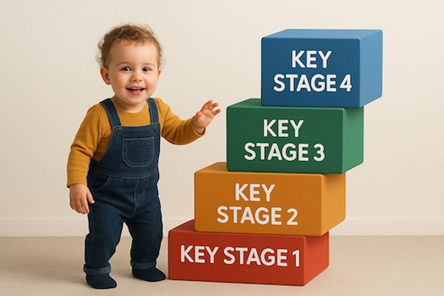What Are Key Stages? A Simple Breakdown for Parents of Toddlers
Before your child is even out of toddlerhood, school can feel like a lifetime away. With nappy changes, playdates and snack time monopolising most of your day, the world of classrooms and homework can seem almost unreal. But in what will feel like the blink of an eye, your child will be donning a school jumper and walking through the big gates for the very first time.

If you’ve ever heard parents or teachers talk about “Key Stages” and wondered what they mean, you’re not alone. Here’s a simple, parent-friendly guide that explains what Key Stages are, how they fit into your child’s school journey and why it’s helpful to understand them even now.
What Exactly Are Key Stages?
In the UK, the school system is split into sections called Key Stages. Each is a stage in your child's learning growth, with goals to allow teachers (and parents) to track progress. Think of them as stepping stones, each one building upon the last to allow children to grow academically, socially and emotionally.
Here's a quick overview:
Early Years Foundation Stage (EYFS) – Ages 3-5 (nursery & reception)
Key Stage 1 (KS1) – Ages 5-7 (years 1-2)
Key Stage 2 (KS2) – Ages 7-11 (years 3-6)
Key Stage 3 (KS3) – Ages 11-14 (years 7-9)
Key Stage 4 (KS4) – Ages 14-16 (years 10-11)
Key Stage 5 (KS5) – Ages 16-18 (years 12-13, Sixth Form or College)
Why Should Parents of Toddlers Care?
You might be thinking, "My child still naps twice a day, why do I need to know about GCSEs?"
Good question. Even if you don't need to memorise every detail, understanding how school in the UK operates can truly allow you to assist your child's development from the very beginning.
Here's why:
* It provides the overview: Getting a sense of where your child is headed can psychologically (and emotionally) prepare you for each phase;
* It highlights what matters now: The Early Years Foundation Stage focuses on play, social skills and early communication, all things you’re already nurturing at home;
* It takes the mystery out of school life: When school time comes, you’ll already understand how learning is structured and what teachers mean by “progress” or “curriculum.”
A Quick Look at the Journey Ahead
Early Years Foundation Stage (EYFS) - 3-5 years
This is your toddler's first official step into education, but don't worry, it's all about learning by playing. They'll explore, build, pretend and make friends, while learning early language, counting and problem-solving. What can you do to help? Read together every day - even five minutes is good, talk about what you're doing, encourage curiosity - answer those constant questions.
Key Stage 1 (KS1) - Ages 5-7
Your child begins primary school. Play becomes proper lessons here and they'll be beginning to read fluently, write simple sentences and perform calculations. How can you help? Make reading enjoyable - not a chore, praise effort, not result, let them learn through play - puzzles, number toys, cooking and stories all count.
Key Stage 2 (KS2) - Ages 7-11
Children become more independent learners, learning more advanced English, Maths, Science and artistic subjects like Art and Music. How can you help? Encourage independence - packing their own bag, remembering homework, talk about what they're learning and be genuinely interested, nourish their curiosity with museum visits or nature walks.
Key Stages 3-5 (Ages 11-18) - The Teenage Years
It may seem a long way off now, but as your child progresses, they'll transition into secondary school, choose GCSE options and eventually work towards A-Levels or apprenticeships. They'll find out what they're interested in, learn how to study and start to think about careers or university throughout these stages.
How you can help in the future:
Be understanding, keep the channels of communication open and encourage them to seek help when they require it. Online tutoring, like the kind offered by Edumentors, for instance, is a lifeline for most parents during these years. UK-based online tutors provide friendly, personalised assistance to pupils of all ages, from primary school through to Sixth Form.
Conclusion
Right now, your toddler’s everyday life probably involves crayons, cuddles and a lot of imaginative play and that’s exactly as it should be. But by understanding the education journey ahead, you’ll be better equipped to support them every step of the way. Each Key Stage will develop your child's enthusiasm for learning, confidence and curiosity. With your help, they'll be more than ready to excel when school begins.